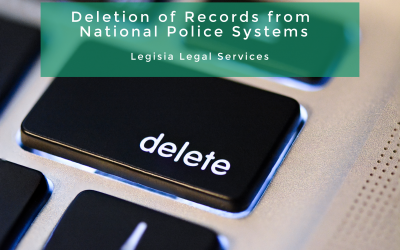Can Local Police Records be Deleted?
In the recent High Court judgment of AB v Chief Constable of British Transport Police [2022] the court ordered the deletion of locally retained police records.

Can Local Police Records be Deleted?
Can Local Police Records be Deleted?
In the recent High Court judgment of AB v Chief Constable of British Transport Police [2022], the court ordered the deletion of locally retained police records.
In the judgment the court emphasised that deletion was highly fact specific and distinguished their ruling from an earlier 2018 ruling. In the earlier judgment the court ruled that retention of local police records was justified.
Facts of Case – Deletion of Local Police Records
The brief facts of the case were that the respondent (AB) had been accused on two separate occasions of sexual assault, once in 2011 and once in 2014.
Accuracy of Locally Held Police Records
There was a dispute over the actual content of the allegations, the initial police reports recorded that AB put his hands between the legs, and under the dress, of the 2011 complainant. In the 2014 allegation it was suggested that AB had placed his hand over the complainant’s jeans in the area of her vagina. AB disputed these facts, and there were inconsistencies in the accounts given by the complainants.
AB suffered from dyslexia and Asperger’s Syndrome and that, as a coping mechanism, he “’stimed’ or rubs material between his fingers and plays mind puzzles by pressing fabric.” AB stated that these coping mechanisms were misinterpreted by the complainants and had resulted in the 2011 and 2014 complaints.
AB challenged the police’s retention of the locally held records on the basis that they were not accurate as according to data protection legislation, and that retention was a disproportionate interference with his right to a private life.
DBS Certificates and Local Police Records
The Court ruled that the police records although they may have contained factual inaccuracies, an Occurrence Summary Report (OSR) is essentially a reflection of what the police have been told. A police report is not a finding of guilt or innocence, and the court held that anyone who has access to such data would understand this fact. When it comes to the disclosure of records, such as on enhanced DBS certificates, the court stated that a person with access to restricted local records would appreciate that “the underlying allegation may or may not be true.”
The court was satisfied that the police had correctly recorded what they had been told, and so there was no inaccuracy in their records.
The court was clear that when deciding whether local records needed to be deleted or not, an assessment of the facts needed to be made to the civil standard (on the balance of probabilities):
It was necessary for the judge to make findings of fact to resolve the issues that were before him. The judge needed to make findings of fact to decide whether the police records are accurate. And the judge needed to establish the basic facts in order to assess the question of proportionality…
…In order to resolve those issues, and after finding that the review was flawed, the judge was entitled to make findings in relation to the underlying incidents in 2011 and 2014. That was relevant to the risk to the public posed by AB, and hence to the proportionality balance.
Original Records Can Remain Even if Inaccurate
The court was at pains to clarify that an OSR does “not purport to record convictions”. An OSR or similar report is a report of how the investigation has progressed, and even if subsequent facts disprove earlier records, the original report needed to remain, to show what had happened in the case:
An OSR provides a brief summary of police involvement in an incident. It is updated during an investigation and provides an audit trail of the actions taken by the police. The Head of Information Management for the appellant provided evidence, which again was accepted by the judge, that an original allegation of a crime is recorded and retained, even if it is subsequently found to be inaccurate. The reason is that it is necessary to retain the record of the allegation to identify the rationale for any police action that is taken, and to provide an audit trial, and also to help identify any inconsistencies in the accounts that are provided.
The parties appear to have been at cross-purposes throughout this litigation as to the accuracy of the OSRs. AB maintains (and the judge accepted) he did not put his hand under the dress of the 2011 complainant, or over the vagina area of the 2014 complainant.
The court found that local police records therefore convey information that is provided to the police, and they do not purport to convey that an incident occurred in the way that the complainant alleged. The court therefore found that the accuracy of the data contained in the reports depends on whether they accurately reflect what the police were told, and what the police did. Accuracy does not depend on what actually happened in the underlying incidents. As the court found the records had accurately reflected what the police had been told, and where the records had been updated when new information was provided, there were no inaccuracies.
Right to Privacy & Local Police Records
With respect to AB’s right to privacy claim, the court was convinced, on the particular facts of his case, that the records ought to be deleted. The original trial judge had concluded that the records should have been removed in 2016, only 2 years after the second allegation in 2014.
The High Court compared the decision to the earlier case of CL, R (on the application of) v The Secretary of State for the Home Department [2018]. In CL’s case there had been three separate allegations against him when he was 14 and 15 years of age. The court conducted a detailed analysis of the facts of each allegation and concluded that there was a justifiable policing purpose to retain the information as it showed a possible pattern of behaviour.
Case Specific Deletion of Local Police Records
In AB’s case, the Court carefully considered the impact of the retention on AB, and in particular how the records impacted him more severely due to his Asperger’s. The Court highlighted that his disability diminished the risk of serious harm that he posed, and increased the distress he experienced as a result of the existence of the records.
The court highlighted that there is a stronger need for the police to retain data in respect of those who pose a substantial risk of harm to the public, than those who pose no real risk of harm. In AB’s case the court found that he posed no real risk to the public, and this was a key relevant factor when assessing the proportionality of retaining the records. The court was keen to stress that their conclusion was highly fact specific. The Court stated in many cases, “it will be proportionate to retain crime reports of offences for long periods of time, particularly where the offences raise public protection issues. That is because, generally, the interference with the subject’s article 8 rights is likely to be modest, whereas there is likely to be a compelling public interest in retention.”
Local & PNC Police Record Removal Solicitor
Although the judgement in AB’s case does not guarantee a right to removal of locally held police records, it does clarify certain important issues.
In our opinion the case does swing the pendulum slightly more in favour of data subjects. Previously the police have been unwilling to consider the removal of any local records for what they would consider more serious offences. For allegations that involved offences such as sexual assault, police forces might typically only undertake a full review after at least 10 years had elapsed, in accordance with the MoPI rules, and may avoid or play lip service to “triggered” reviews. Hopefully, due to AB’s case, in the future police forces will undertake a more nuanced and balanced approach to local record retention decisions.
If you have been accused of a crime, and you are concerned about the records the police hold, then please get in touch.
We have successfully challenged hundreds of records held on the Police National Computer (PNC), as well as having locally held police records deleted for many clients.
Contact Us
Related Articles
Related
Should I Accept a Police Caution?
Should I accept a police caution? We are often asked by clients whether they should accept a police caution.Should I accept a police caution?Should I accept a police caution?We are often asked by clients whether they should accept a police caution. Whether to accept a...
Police Caution Removal Solicitor
If you have received a police caution, we are experts in police caution removal.Police Caution Removal SolicitorPolice Caution Removal SolicitorIf you have received a police caution, we are experts in police caution removal. We are a dedicated legal practice focusing...
The HCPC and Police Cautions
If you have received a police caution, and you are currently regulated by the Health and Care Professions Council (HCPC), or you hope to be, then you will need to consider the HCPC’s rules on the disclosure of criminal records.The HCPC and Police CautionsThe HCPC and...
Should I Accept a Police Caution?
Should I accept a police caution? We are often asked by clients whether they should accept a police caution.Should I accept a police caution?Should I accept a police caution?We are often asked by clients whether they should accept a police caution. Whether to accept a...
Police Caution Removal Solicitor
If you have received a police caution, we are experts in police caution removal.Police Caution Removal SolicitorPolice Caution Removal SolicitorIf you have received a police caution, we are experts in police caution removal. We are a dedicated legal practice focusing...
The HCPC and Police Cautions
If you have received a police caution, and you are currently regulated by the Health and Care Professions Council (HCPC), or you hope to be, then you will need to consider the HCPC’s rules on the disclosure of criminal records.The HCPC and Police CautionsThe HCPC and...
Deletion of Records from National Police Systems
It is possible to apply for the deletion of your records from National Police Systems, namely the Police National Computer (PNC), the National DNA Database (NDNAD) and also the National Fingerprint Database (IDENT1).Deletion of Records from National Police...

Head Office
Legisia Legal Services
The North Colchester Business Centre
340 The Crescent
Colchester
Essex, CO4 9AD
Cases are conducted nationwide & internationally
Additional consultation Address (Not Postal)
50 Liverpool Street
London EC2M 7PY




